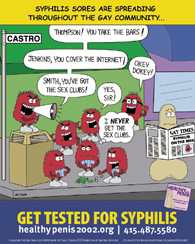The San Francisco Health Department has been forced to withdraw bus shelter ads aimed at combating rising syphilis infections after the company that owns the city's bus shelters refused to display a male genitalia cartoon.

While the original ads (pictured above) will still be used in gay newspapers, clubs and other venues, Viacom Outdoors will display the ads, which include a cartoon syphilis sore minus the offensive bits.
San Francisco's syphilis cases jumped to 183 in the first four months of this year, up from just 41 during the same period in 1998. The US$50,000 campaign is aimed at gay and bisexual men who experts say need innovative messages to encourage them to get tested for sexually transmitted diseases.
Viacom Outdoors is believed to have a no-nudity clause and "they interrupted this cartoon penis as violating that no-nudity clause, which is absolutely ridiculous," said Dr. Jeffrey Klausner, head of the health department's sexually transmitted disease unit.
Klausner thought that the ads fit the bill perfectly. "It underwent community reviews and various staff in the health department felt this was sex-positive and fun, and it was created by the gay community in San Francisco."
While the original ads will still be used in gay newspapers, clubs and other venues, Viacom Outdoors will display the ads, which include a cartoon syphilis sore minus the offensive bits.
The same ad was slated to run simultaneously in Los Angeles, where syphilis rates have risen 30 percent since 2000. However, officials in LA also decided to remove the penis from its ads.
Dr. Peter Kerndt of the health department's STD program said: "It's patronizing to gay men. We didn't want to select the penis as a logo for the gay community. We have more respect for the gay community than that."
Les Pappas of Better World Advertising, who created the ads, said the cartoons were meant to be a lighthearted way to increase awareness about a very serious problem in gay communities.
"We wanted to be honest about the issue and not scare people and not have people turned off to it. We thought the idea of using humor would be more engaging."
